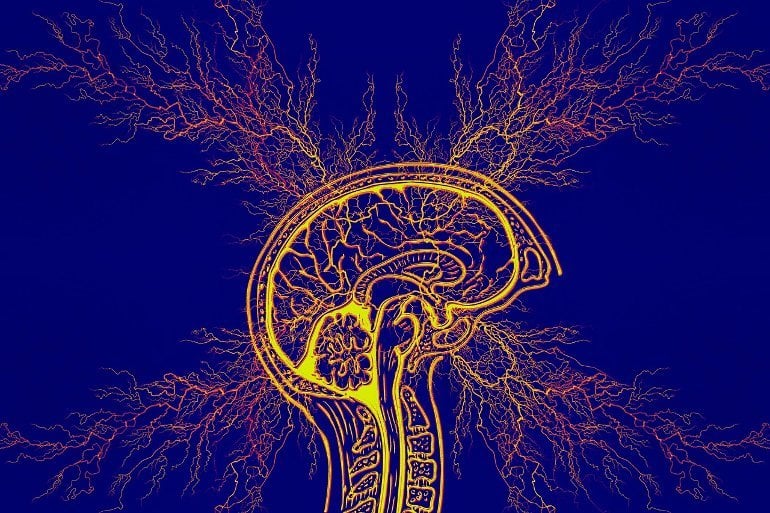Abstract: An intranasally delivered oxytocin by-product helped enhance cognitive perform and decreased cognitive impairment in mouse fashions of Alzheimer’s illness.
Supply: Tokyo College of Science
The cognitive decline and reminiscence loss noticed in Alzheimer’s illness (AD) is attributed to the buildup of β-amyloid protein (Aβ), which impairs neural perform within the mind.
Experimentation has proven that oxytocin, a peptide hormone primarily accountable for parturition, bonding, and lactation, additionally regulates cognitive conduct within the rodent central nervous system (CNS).
This discovering, together with the identification of oxytocin receptors in CNS neurons, has spurred curiosity within the potential function of oxytocin in reversing reminiscence loss tied to cognitive issues like AD.
Nonetheless, peptides like oxytocin are characterised by weak blood-brain barrier permeability, and so can solely by effectively delivered to the mind by way of intracerebroventricular (ICV) administration. ICV, nevertheless, is an invasive approach which is impractical to implement clinically.
Delivering peptides to the CNS by way of intranasal (IN) administration is a viable medical choice. Prof. Chikamasa Yamashita at Tokyo College of Science lately patented a way to extend the effectivity of peptide supply to the mind, by introducing cell-penetrating peptides (CPPs) and a penetration-accelerating sequence (PAS) by way of structural modifications.
Earlier work had confirmed that each CPPs and the PAS profit the nose-to-brain supply pathway. Now, a gaggle of researchers, led by Prof. Akiyoshi Saitoh and Prof. Jun-Ichiro Oka, leveraged this strategy to organize an oxytocin by-product: PAS-CPPs-oxytocin.
Their findings had been printed on-line in Neuropsychopharmacology Reviews on 19 September 2022.
“We now have beforehand proven that oxytocin reverses amyloid 𝛽 peptide (25-35) (A𝛽25-35)-induced impairment of synaptic plasticity in rodents. We needed to see if PAS-CPPs-oxytocin may very well be delivered extra effectively to the mouse mind for medical software, and if it improved cognitive useful conduct in mice,” states Prof. Oka.
The group first developed an A𝛽25-35 peptide-induced amnesia mannequin by supplying A𝛽25-35 to the mouse mind utilizing ICV supply. In the course of the course of the examine, the spatial working and spatial reference recollections of those mice had been evaluated utilizing the Y-maze and Morris water maze (MWM) assessments.
After confirming that reminiscence was affected in A𝛽25-35-impaired mice, PAS-CPPs-oxytocin and native oxytocin had been administered utilizing the IN and ICV routes respectively, to see if studying and reminiscence improved within the handled mice.
Lastly, the distribution of the IN-administered oxytocin by-product in mind tissue was profiled by imaging of a fluorescent-tagged oxytocin by-product.
The outcomes of this examine had been fairly promising. The tagged PAS-CPPs-oxytocin confirmed distribution all through the mouse mind following its IN administration.

Whereas the ICV administration of native oxytocin improved check outcomes in each the Y-maze and MWM assessments, the IN administered PAS-CPPs-oxytocin yielded reminiscence bettering results within the Y-maze check.
Hailing the workforce’s discovery, Prof. Oka says, “My workforce is the primary to indicate that the oxytocin by-product can enhance the A𝛽25-35-induced reminiscence impairment in mice. This implies that oxytocin might assist cut back the cognitive decline we see in Alzheimer’s illness.”
Why are these findings clinically helpful? Prof. Oka explains the broader implications of their work, “The oxytocin by-product enters the mind extra effectively. Moreover, since IN supply is a non-invasive process, this modified model of the hormone may doubtlessly be a clinically viable therapy for Alzheimer’s illness.”
Funding: The examine acquired funding from JSPS KAKENHI (Grant No.: 15K07974 to J-I.O.); the Mochida Memorial Basis for Medical and Pharmaceutical Analysis (2015 to S.S-H.); the MEXT-Supported Program for the Strategic Analysis Basis at Personal Universities (2014-2018 to J.-I.O.); and the Grant-in-Support for JSPS Fellows (Grant No.: JP-21J20036 to J.T.).
About this Alzheimer’s illness analysis information
Writer: Hiroshi Matsuda
Supply: Tokyo University of Science
Contact: Hiroshi Matsuda – Tokyo College of Science
Picture: The picture is within the public area
Unique Analysis: Open entry.
“Intracerebroventricular administration of oxytocin and intranasal administration of the oxytocin derivative improve β-amyloid peptide (25–35)-induced memory impairment in mice” by Chikamasa Yamashita et al. Neuropsychopharmacology Reviews
Summary
Intracerebroventricular administration of oxytocin and intranasal administration of the oxytocin by-product enhance β-amyloid peptide (25–35)-induced reminiscence impairment in mice
Intention
We beforehand reported that oxytocin, a peptide hormone, can reverse the β-amyloid peptide (25–35) (Aβ25–35)-induced impairments of the murine hippocampal synaptic plasticity. On this examine, we examined the consequences of oxytocin on the Aβ25–35-induced impairment of cognitive conduct in murine with the intention to examine the potential of oxytocin as a medical therapy software for Alzheimer’s illness (AD).
Strategies
The Y-maze and Morris water maze (MWM) assessments had been carried out. For the reason that intracerebroventricular (ICV) administration is each invasive and impractical, we additional utilized intranasal (IN) supply to the mind. For this goal, we ready an oxytocin by-product containing cell-penetrating peptides and a penetration accelerating sequence, which was subsequently utilized in our IN administration experiments.
Outcomes
We herein confirmed that the ICV administration of oxytocin in mice exerted memory-improving results on the Aβ25–35-induced amnesia in each the Y-maze and MWM assessments. The IN administration of the oxytocin by-product exhibited memory-improving results within the Y-maze check. Furthermore, we acquired proof that the fluorescein isothiocyanate-labeled oxytocin by-product was distributed all through the mouse mind following its IN administration.
Conclusion
Our outcomes recommend that the oxytocin by-product is efficient for its IN supply to the mind and could also be notably helpful within the medical therapy of cognitive impairment, resembling that characterizing AD.






Discussion about this post